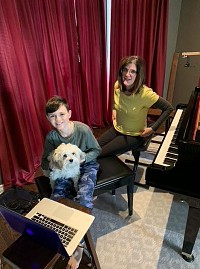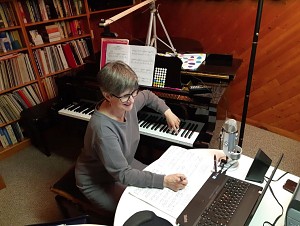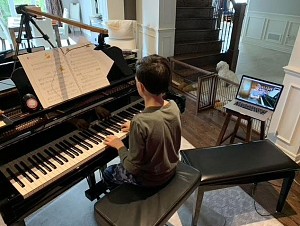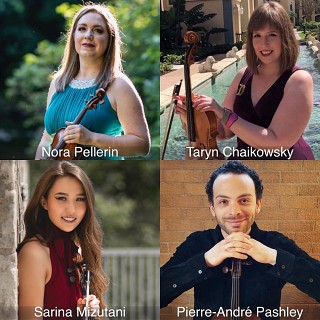 |
||||||||||||||
Expanding the Idea (and Reality)of an Inclusive Canadian Suzuki Community Where “Every Child Can”—”Every Teacher Can”Recent world events have raised visceral questions of basic human rights and sparked urgent demands for change. At the core they tell us that beyond our daily good efforts and results, we as Canadian Suzuki teachers still have some work to do in stewarding and sustaining a just and caring environment for all of our present and future Suzuki students, teachers, and parents. We are being called upon, right now, to listen to, to recognize, and to make amends with those children, parents and teachers, who may have been excluded from the many benefits of our Suzuki community based on race (including Canadian indigenous communities), gender, sexual orientation, disability or poverty. And though in many ways systemic, these exclusions, whether glaring or subtle, may not be conscious or intentional. As teachers we aspire to live up to Dr. Suzuki’s dream that ‘Every Child Can’, but we may not always truly understand to what degree some children in our midst have been deprived of the tools, the environment or the education with which to nurture their musical voices in support of their own happiness and evolution. While this kind of change can be inspiring to many of us, the challenge of “right now” is that, anything “beyond our daily good efforts and results” can feel daunting to impossible amidst the isolation and uncertainty of COVID 19, and the events of the world in general. Not to mention the nitty gritty of juggling teaching on-line, home schooling, worrying about vulnerable family members, cancelled performance pay cheques and much more. Fortunately many of us have been able to find some comfort in reading the many inspiring stories of solidarity posted online by Suzuki teachers from coast to coast to coast as well as from around the globe. It might also be worth noting that Dr. Suzuki himself pursued his dream of ‘Every Child Can’ in the midst of terrible hardships in post WW 2 Japan, a moment where the seeds of his conviction were nurtured and developed: that every child can be raised and nurtured to be a fine human being through a community of music educators. Now is a critical moment in our own Suzuki journey to actively acknowledge and support the basic principles of human rights tirelessly championed by leaders and organized communities focused on eradicating discrimination and fostering inclusivity. With both sadness for the stark examples of what’s not working, and with hope for a better, more inclusive future, shall we (in a kind and sustainable way) pledge to forge a new dialogue, beginning with listening? Then reflect both quietly on our own and as a community? And then, based on mutual understanding and respect, act on the kind of next steps that might move us closer to Dr. Suzuki’s dream that ‘Every Child Can’? Perhaps also leading to a world where ‘Every Teacher Can’. In the words of Nelson Mandela: “It is not beyond our power to create a world in which all children have access to a good education. Those who do not believe this have small imaginations.” We know that examining and establishing an expanded awareness and practice of inclusiveness both as a society and as a Suzuki community will require sustained effort and understanding on everyone’s part. But in diversity we can find our strength. Please do share your ideas on how you have considered or plan to make your studio more inclusive perhaps by offering scholarships,offsetting group class costs through bursaries, including the traditional music of the various cultural groups within your school, or creating policies on discrimination. These are but a few examples. And if you are keen to develop and/or implement guiding principles and actions, we have included in this issue the SAO (Suzuki Association of Ontario) statement on racism as a possible guide. (The SAO document includes reference materials you may find useful.) You may also find the discussion group on the SAA website to be a useful reference https://suzukiassociation.org/discuss/53594/. Canadian e-Newsletter Team Never too old to learn a new trick!Suzuki said, “I played with children so that I could learn from them.” COVID-19 has forced me to learn how to play with my students in a new way. The most interesting part of it all, is that my tech teacher has been Oliver Brennan, my 11-year-old student! I was never very interested in online teaching, but in view of the present situation, I felt I should give it a try. Either that or finish off my teaching year in March. So, as many of my colleagues have done, I set up my studio to teach online.  Step 1: Very basic – My computer with my usual speakers is set up on my husband’s Black & Decker Workmate, so that my students can view me at the piano from the side. Step 2: Fancier – A webcam, loaned to me by Oliver, has been added. It is set up on a tripod that my husband has adapted in order to show the keyboard from above. Step 3: Really fancy!—I ordered a professional microphone to improve the sound quality for my students. The response from my students has been excellent! Parents are happy to maintain a schedule and several of my students have taken advantage of this time to really move ahead. Two students have had their end of volume recitals online: one on SKYPE and the other on Zoom, both very successful! Teaching online has helped me develop new technical and communication skills. I have learned to talk a little less… Those who know me well would agree that this is a great accomplishment!  Online teaching has allowed me to witness my students’ home setup. As pianists, we don’t see our students’ instruments at lessons. Hearing and seeing the instrument they are playing at home has given me a toolbox to assist them with the home set up and help them consider possible instrument improvements. This part of online teaching has convinced me that it would be a good idea, in the future, to have an online meeting with new families to help them with home set up before starting lessons. Apart from the music, one of the best things about online teaching has been the opportunity to maintain contact with the families that make my studio what it is! There are, of course, some disadvantages: sound quality, interruptions in the stream and the absence of physical contact. Despite these inconveniences, the online teaching experience has been very satisfying and is certainly something that I will consider in the future when students can’t come to lessons because of bad weather.  It is not that I will be able to have the traditional end-of-May studio concert. No worries, I’m planning on having it on Zoom. My teacher Ollie seems satisfied with my progress. I’m very happy with the knowledge that I have acquired and I look forward to becoming a better techie with time! Josée Desjardins, Suzuki Piano Teacher, Ste-Julie, QC When my Dad told me we would be doing a virtual lesson, I thought “cool” coz I really like technology. My dog can now come to my piano lesson too.We experimented with Skype & Zoom but prefer Skype better for 1:1 calls and Zoom for multi-person calls—but both work fine. I hope that the concert won’t be cancelled but if it is, we can still do it on Zoom.My Dad has to listen better and pay more attention during the lesson as he’s in charge of switching between cameras—thanks Dad ! I don’t think Dr. Suzuki was expecting the corona virus or virtual lessons but I think he would be happy looking down from the clouds. Oliver Brennan Age 11—Repentigny, Québec, 2020 Black Lives Matter! and—Our Suzuki Piano heritageRemembering: Ruby Sneed, Suzuki Piano Teacher Citizens of all nations have been moved and sobered by the events of the last weeks. The SAA and SAO have issued statements to reflect concern and support for the Black Lives Matter movement. Canadian piano teachers recognize that one of the founders of Suzuki piano in Canada was Ruby Sneed.Some teachers will also remember her daughter, Brenda Harvey, a Suzuki piano teacher in Calgary in the 1980s. While we might have composed an article based on Ruby’s biography found online, the e-Newsletter committee suggests you read the entire article about Ruby and her many contributions to the music world.*** https://bcblackhistory.ca/ruby-sneed/ Please take a few moments to read about Ruby’s life. We hope that we can learn more about her and about her daughter Brenda in a forthcoming issue! My Adventure as a Suzuki teacher in Thunder Bay, ONby Michelle Zapf-Belanger I grew up as a Suzuki student in Etobicoke and did my post- secondary music studies in Toronto. Eleven years ago, I got a job to play in the Thunder Bay symphony. I had some experience teaching and was aware that teaching was important to me, so I started right away when I moved. I advertised in the newspaper and explored what was already happening in town. I definitely tried to forge connections with teachers both Suzuki and traditional. You need to meet people where they’re at and find common ground. Before I went to Thunder Bay, I did three units of training. The idea was that I was going to be starting a studio partnership with my husband, who is concert master of the symphony, and he had not done any Suzuki training. So that summer he took unit 1 and I redid it. I think it helps that we took the class together so that we had the same vision as teaching partners and were able to start the collaboration from that point. We did not inherit a studio, so had a bunch of beginners the first year. This balanced well with our performing schedule and we kept building the studio. Through our student performances in the community and with the symphony and word of mouth, 11 years later, I have about 20 or 25 students. I’m thrilled to have a crop of teenagers along with the little children. I am very much focused on collaborating with the other Thunder Bay musicians. I always try to encourage the other Symphony players to teach a little bit. I’ve volunteered to pull all the students together for group classes, monthly recitals and orchestras. Tom conducts the Youth Orchestra. Because we are combining Suzuki and traditionally taught children, I do group classes now up until book 2 and then they combine with other children to form the junior strings group that feeds into the Youth Orchestra. We also run an inclusive summer program. This way we help create a community for the students that are not just ours but everybody’s. I involve the other teachers by hiring them to do sectionals and coaching. Challenges: It is difficult to impart the Suzuki vision if parents do not attend institutes, workshops or conferences where they meet hundreds of others who have the same vision. The cost of going somewhere from Thunder Bay is more prohibitive. This makes it more difficult to persuade parents as to the value of practicing, group classes, and parental involvement Advice for people starting up programs in smaller communities:
Challenges of the PandemicThe coronavirus became a significant issue in Edmonton just as we planned to host our Spring Festival, our annual adjudicated piano event. As we made the decision to cancel the festival, the Edmonton Suzuki Piano School (ESPS) also shifted from in-person lessons, and began teaching online by the third week of March. ESPS teachers shared experiences and collaborated to determine best practices with equipment, technology, and teaching techniques regarding online lessons. We benefitted from already being familiar with web-conferencing among our teacher and admin group. We also utilized our existing infrastructure to communicate with parents about online lessons, tips for improving them, and for encouraging dialogue between teachers and families. Parents and students also quickly came together to work with their teachers to determine the best medium for connection and improving sound and picture quality during lessons. It also helped that we were already in the thick of a 100-day practice challenge that has, for many, encouraged regular practice and introduced an extra level of motivation. The challenge wrapped up at the end of April, and in addition to small prizes provided by our teachers, there was a draw for additional prizes from our society. Our ESPS teachers have observed some unanticipated benefits of online teaching. Teachers have appreciated the opportunity to observe more about each student’s home practice environment. Teachers have also observed a significant improvement in the quality and quantity of student practice, and many of our students are progressing rapidly due to all of this extra time at home. Our next challenge is to prepare for our annual June recital series and graduation event. Only time will tell whether these will be at a recital hall, videos taken in the students’ own homes, or in a live, online format. Everyone has worked to gain the information and knowledge required to offer quality online lessons. Our teachers continue to share ideas, adapt their teaching methods, and develop new ways to motivate their students in this new format of teaching. Teachers have always encouraged their students and parents to be flexible, hard-working and open- minded, and they have certainly endeavoured to model all of these traits, during this pandemic. Edmonton Suzuki Piano School Have you heard about the Suzuki Association of Ontario – SAO?The Suzuki Association of Ontario (SAO) is a registered not-for-profit chapter affiliate of the SAA, and their most significant representation in Canada. SAO members have access to SAO Area Reps across the province, who are available to answer questions or address concerns, or promote the work, ideas, and quarterly newsletter contributions of SAO members. Other great SAO resources and perks include:
The SAO holds an annual conference each Fall, hosted in a different Ontario city or town. New members receive a significantly discounted fee to attend this professionally enriching event. SAO conferences are the ultimate opportunity to meet all your Ontario Suzuki colleagues, attend inspiring workshops and presentations, and observe masterclasses. One of Dr. Suzuki’s visions for the future was for teachers to build a collaborative and supportive community, sharing educational goals via the Suzuki Method. The SAO is here to support members in teaching, learning and contributions to the vibrant Suzuki community that exists in Ontario. For more information about the SAO, please visit www.suzukiontario.org. Lenni Jabour Interview with Ellen Kogut, Member of Board of Suzuki Association of the Americasby Karen Kimmett Ellen Kogut has been a SAA Board Member for the last two years and was inspired to stand for this office after speaking with various colleagues and realizing that she had a deep desire to want to give back to the organization that has given her so much in the past. As a Board member, Ellen has been struck by the immensity of the day to day governance of the SAA and the many tools and skills needed to govern and run such a large organization. For her, it has been a privilege to see the way the Board governance in action and to see how it works collectively to create consensus and ‘One Vision’ . Ellen feels that she has gained so much herself in being a Board member and has today a much greater appreciation of the scope of the work that the Board undertakes and finds it inspirational to see how ideas are discussed and shared, always with a vision that serves the greater Suzuki community. A highly experienced and trained Suzuki teacher and chamber music coach living in Montreal, Ellen aspires to bring back the knowledge that she has gained during her Board term to share with other Canadians and to perhaps inspire them to serve on a future SAA Board. Currently the only Canadian serving on the SAA Board, Ellen appreciates how important it is that SAA policies reflect and serve all of the diverse regions, countries and languages that make up the SAA while always striving to keep in focus the fundamentals of the Suzuki method in sight. Past Canadian Members of the SAA Board This is a moment to thank the many Canadian members who have served on the Suzuki Association Board in the past. We are grateful for their years of commitment and leadership in helping further Dr. Suzuki’s work both in Canada and for all of the Americas.
Two-year Suzuki pedagogy course first cohort graduates in spite of COVID-19by Paule Barsalou  The first cohort of the Suzuki String School of Guelph two-year Suzuki violin pedagogy course graduated this past April, in spite of having to finish their last term online due to COVID-19. The first four teachers to graduate are Sarina Mizutani, Pierre-André Pashley, Nora Pellerin and Taryn Chaykowski. They shared their final project, a lecture recital, on Zoom. In attendance were my teacher trainer colleagues Elayne Ras, Karen Kimmett and David Evenchick. This final project covered the first 8 volumes of the Suzuki Violin School, tracing particular aspects of the musical and technical development of the student through the repertoire. As their trainer, I’m very proud of these four dedicated course participants who have grown so much in these last two years. Through our time together, they have not only studied and memorised eight volumes of Suzuki violin repertoire but have also observed and reflected upon the development of young musicians through these different stages of learning, analysed supplementary technical exercises and repertoire, discussed strategies for working with parents, experienced teaching young students, and received feedback on their own teaching. They also had a chance to observe the development of students from week to week through watching the same student several weeks/months in a row. I feel very hopeful for this new group Suzuki teachers who take their own professional development so seriously and will become leaders in our community. For those of you who may be interested in taking this course or know some violinists who are keen on exploring Suzuki pedagogy in an in-depth, sustained way, A new cohort of violinists will be starting in the fall. The course is hosted by Wilfrid Laurier University and WLU students can receive a credit for taking it. It is the only program of its kind in Canada and is offered in violin and cello. A huge thank you to WLU and, in particular, Jerzy Kaplanek, chair of the string department at the Faculty of Music, for their support of our teacher training program. A MUSIC TEACHER’S TESTAMENTby Merlin B. Thompson I am a music teacher. Whether by intention, by accident, or by calling. Honored to nurture musical journeys. My days are rich with meaning and value. I open doors. I show the way. I jostle. I step aside. Smiles bind us one to another. Conversations expand our mutual understanding. Rhythms of certainty and uncertainty punctuate the path. Safety and security cushion the journey, while Fear inflicts wounds on success and shame on failure. Surrender is not an option. Music teaching resonates with energies of the universe. We hold it in our hands and in our imaginations. My commitment is to serve all with grace and generosity. The enthusiastic. The dedicated. No matter the twists and turns, celebrations and setbacks, I play my part for music and humanity. I bring empathy, dignity, and gratitude This is my testament. |
||||||||||||||
|
You received this message because you are a member or supporter of the Suzuki Association of the Americas. Suzuki Association of the Americas |
||||||||||||||